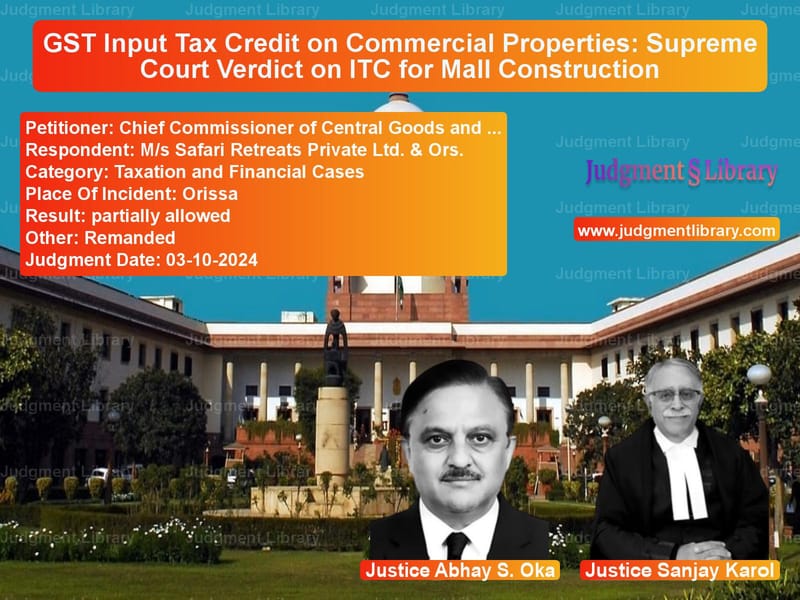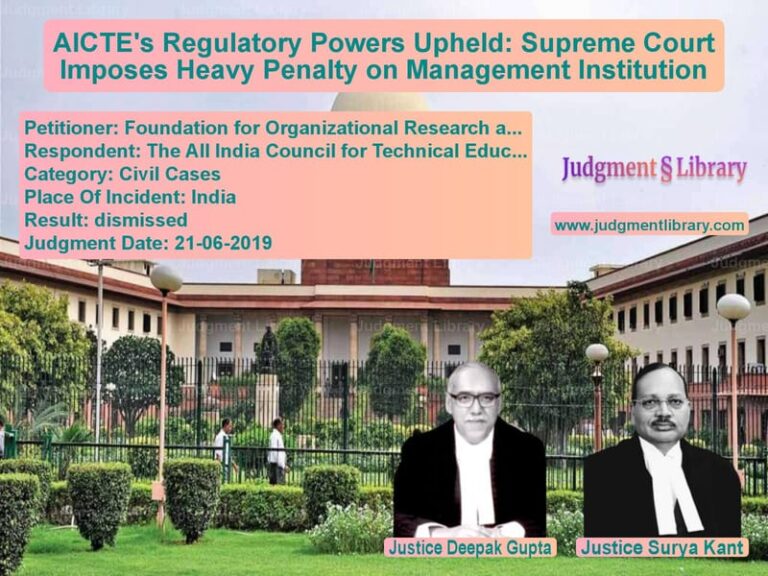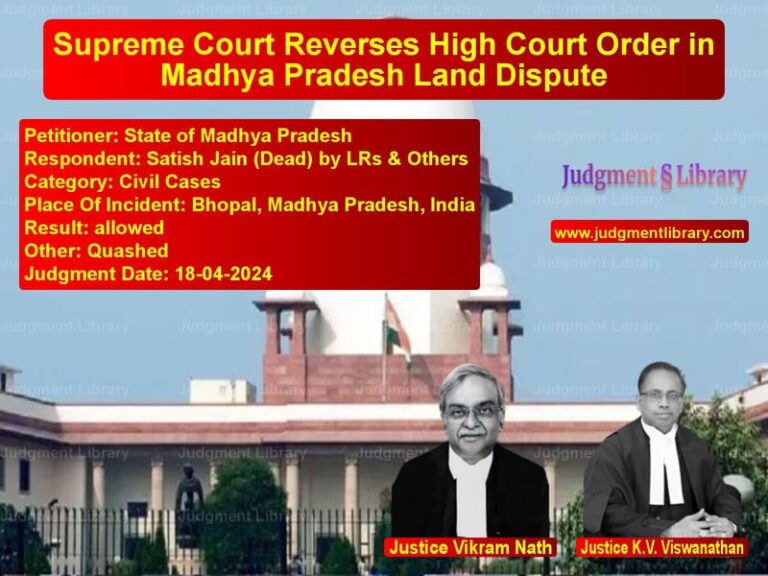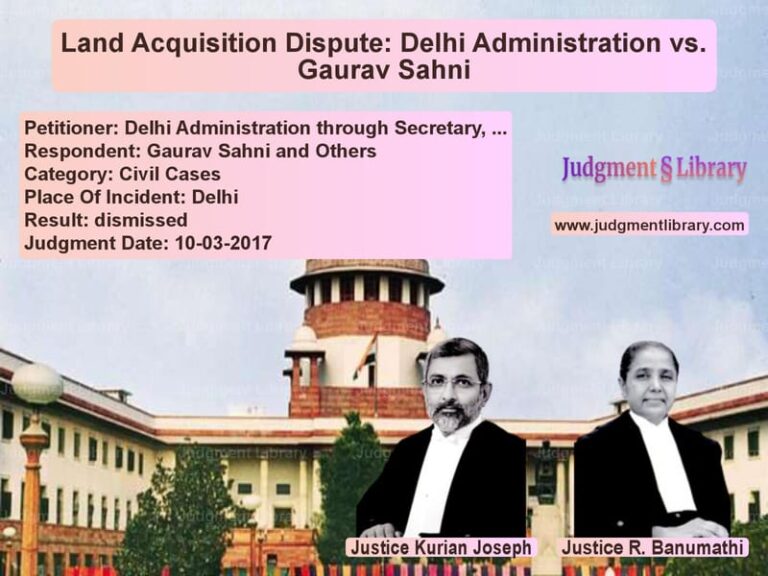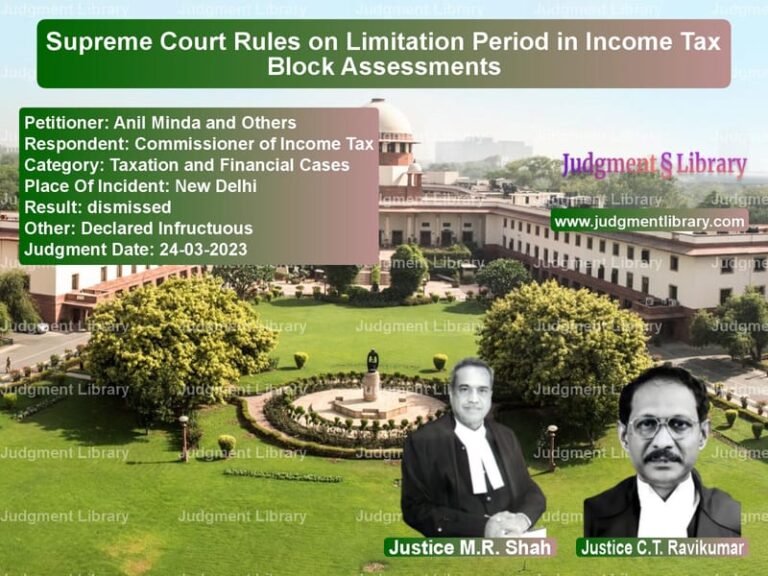GST Input Tax Credit on Commercial Properties: Supreme Court Verdict on ITC for Mall Construction
The dispute regarding Input Tax Credit (ITC) under the Central Goods and Services Tax Act, 2017 (CGST Act) for commercial properties like malls has led to significant legal scrutiny. In the case between M/s Safari Retreats Private Ltd. & Ors. and the Chief Commissioner of Central Goods and Service Tax & Ors., the Supreme Court deliberated on whether ITC could be claimed for the construction of a shopping mall that was later rented out to tenants. The case questions the validity and interpretation of Section 17(5)(d) of the CGST Act, which restricts ITC claims on immovable property construction.
Case Background
M/s Safari Retreats Private Ltd., a commercial property developer, constructed a shopping mall and sought to claim ITC on the GST paid for construction materials, services, and other expenses incurred in building the mall. The company argued that since they were renting out the mall premises, the ITC should be allowed as the rental income attracted GST. However, the tax authorities denied this claim, citing Section 17(5)(d) of the CGST Act, which blocks ITC for the construction of immovable property unless used for further taxable supplies.
Feeling aggrieved, the company approached the Orissa High Court, which ruled in their favor, stating that denying ITC in such cases would be against the fundamental principle of GST, which is to eliminate the cascading effect of taxes. This decision was challenged by the tax authorities in the Supreme Court.
Petitioners’ Arguments
- The petitioners (Safari Retreats Pvt. Ltd.) contended that Section 17(5)(d) was unconstitutional as it violated Articles 14 (right to equality) and 19(1)(g) (freedom to practice any profession) of the Constitution.
- They argued that GST is a destination-based tax aimed at eliminating cascading taxation, and denying ITC on immovable property construction contradicts this principle.
- The classification between constructing an immovable property for own use and renting it out was arbitrary and did not serve any rational purpose.
- They pointed out that rental income was a taxable supply under GST, and hence, ITC on construction should be allowed as it directly contributed to a taxable activity.
- They invoked the principle of res ipsa loquitur, arguing that the presence of GST liability on rent proves that ITC should be allowed.
Respondents’ Arguments
- The government argued that ITC is a statutory benefit and not a fundamental right, and the legislature has the authority to impose reasonable restrictions on it.
- They asserted that the exclusion under Section 17(5)(d) was a deliberate policy decision to prevent revenue leakage, as construction of immovable property primarily results in a capital asset.
- They argued that allowing ITC for commercial property construction could lead to tax avoidance strategies where businesses might construct properties, claim ITC, and later sell them as non-taxable transactions.
- They contended that the classification between construction for own use and resale was necessary, as ITC is meant for goods and services used in further taxable supplies, not for creating fixed assets.
Supreme Court’s Observations
- The Court emphasized that ITC is not an inherent right but a statutory benefit subject to conditions prescribed by the legislature.
- It noted that renting out immovable property qualifies as a taxable supply under GST, making it eligible for ITC in principle.
- The Court examined whether the phrase “plant or machinery” in Section 17(5)(d) includes commercial properties like shopping malls.
- The “functionality test” was applied to determine whether a building serves as an essential business tool or merely as a passive structure.
- The Court held that malls and similar commercial structures, if essential for carrying out taxable supplies like leasing, could qualify for ITC.
Supreme Court’s Verdict
- The Court upheld the constitutional validity of Section 17(5)(d) but ruled that its interpretation must consider the business functionality of the property.
- It remanded the matter back to the Orissa High Court to decide whether the shopping mall in question meets the “functionality test” and should be eligible for ITC.
- The judgment clarified that commercial properties used for leasing or taxable activities could qualify as “plant” under the law, making them eligible for ITC.
- It ruled that if ITC is denied, it should be based on a rational and clear distinction between taxable and non-taxable supplies.
Impact of the Judgment
This ruling is a landmark in GST jurisprudence, as it opens avenues for commercial property developers to claim ITC on construction expenses when the property is used for taxable purposes. While the Court did not strike down Section 17(5)(d), it provided clarity on how it should be interpreted to align with GST’s objectives.
The decision provides a framework for businesses engaged in leasing commercial spaces to claim ITC, provided they meet the “functionality test” outlined by the Court. It also underscores the importance of legislative clarity in tax provisions to avoid ambiguity and litigation.
Petitioner Name: Chief Commissioner of Central Goods and Service Tax & Ors..Respondent Name: M/s Safari Retreats Private Ltd. & Ors..Judgment By: Justice Abhay S. Oka, Justice Sanjay Karol.Place Of Incident: Orissa.Judgment Date: 03-10-2024.
Don’t miss out on the full details! Download the complete judgment in PDF format below and gain valuable insights instantly!
Download Judgment: chief-commissioner-o-vs-ms-safari-retreats-supreme-court-of-india-judgment-dated-03-10-2024.pdf
Directly Download Judgment: Directly download this Judgment
See all petitions in Income Tax Disputes
See all petitions in GST Law
See all petitions in Tax Evasion Cases
See all petitions in Banking Regulations
See all petitions in Tax Refund Disputes
See all petitions in Judgment by Abhay S. Oka
See all petitions in Judgment by Sanjay Karol
See all petitions in partially allowed
See all petitions in Remanded
See all petitions in supreme court of India judgments October 2024
See all petitions in 2024 judgments
See all posts in Taxation and Financial Cases Category
See all allowed petitions in Taxation and Financial Cases Category
See all Dismissed petitions in Taxation and Financial Cases Category
See all partially allowed petitions in Taxation and Financial Cases Category

